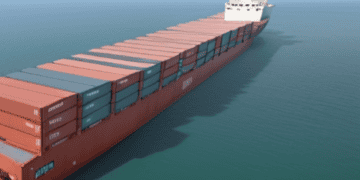The United States has announced plans to finance the construction of a deep-sea container terminal in Sri Lanka, contributing over $550 million towards the project. The initiative is seen as a strategic move in countering China’s growing influence in the Indian Ocean region.
Sri Lanka’s geographical position along the busiest global shipping route, connecting the Middle East to East Asia, adds significant strategic value to its maritime infrastructure. The proposed Colombo West International Terminal, spanning 1.4 kilometers in length and 20 meters in depth, will have an annual capacity to handle 3.2 million containers.
India’s Adani Group leads the consortium responsible for constructing the terminal, which is estimated to cost around $700 million. The terminal is situated adjacent to a Chinese-operated jetty in Colombo’s extensive port area.
The funding for this project is being provided by the International Development Finance Corporation (DFC), a United States government agency. The DFC is contributing $553 million, emphasizing the project’s role in transforming Colombo into a premier logistics hub and its strategic placement at the confluence of key shipping routes and emerging markets.
This US-backed financing emerges at a crucial time as Sri Lanka grapples with a severe financial and economic crisis. The DFC, established as a response to China’s expansive Belt and Road Initiative, aims to support global infrastructure development, often in direct competition with Chinese investments.
Controversies have arisen around some Chinese projects in Sri Lanka, notably the Hambantota Port, which was leased to China for 99 years after Sri Lanka struggled to repay Chinese loans. This raised international concerns about China’s “debt trap diplomacy” and its growing influence. There have also been regional security concerns, especially from India and the US, regarding China’s maritime activities near Sri Lanka, including the docking of Chinese submarines near the site of the new Adani-led project.
Sri Lanka has maintained that its ports will not be used for military purposes against any other nation, despite these geopolitical tensions.
Your source for supply chain report news updates: The Supply Chain Report. For international trade insights and tools, head to ADAMftd.com.
#USFinancing #SriLankaTerminal #DeepSeaTerminal #AdaniGroup #DFCInvestment #ColomboPort #IndianOceanStrategy #LogisticsHub #GlobalShipping #Geopolitics #InfrastructureDevelopment #DebtDiplomacy #BeltandRoad #MaritimeSecurity #IndoPacificStrategy #AdaniConsortium #USvsChina #EconomicCrisis #RegionalSecurity #TradeRoutes #StrategicInvestment
















